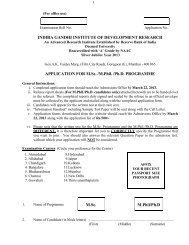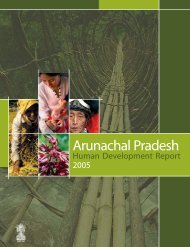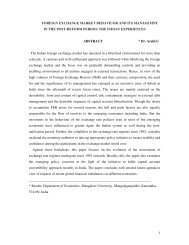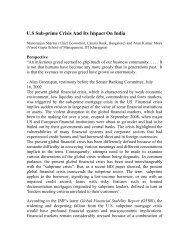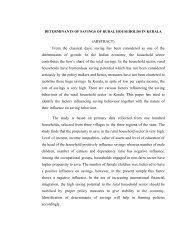National Human Development Report: 2001 - Indira Gandhi Institute ...
National Human Development Report: 2001 - Indira Gandhi Institute ...
National Human Development Report: 2001 - Indira Gandhi Institute ...
- No tags were found...
You also want an ePaper? Increase the reach of your titles
YUMPU automatically turns print PDFs into web optimized ePapers that Google loves.
84HEALTH ATTAINMENTS & DEMOGRAPHIC CONCERNSNATIONAL HUMAN DEVELOPMENT REPORT <strong>2001</strong>attain acceptable standards of good health for the population in the country.As per the Constitutional allocation of responsibilities between theCentral and State Governments, health and family welfare has beenidentified as a State subject. The main responsibility of infrastructure andmanpower building rests with the State Governments. However, the CentralGovernment has over the last five decades provided supplementary funds forcontrol of major communicable, as well as non-communicable diseases, byinitiating national level programmes, in some cases, with the help ofassistance from foreign agencies.At the time of independence, communicable diseases were a majorcause of morbidity and mortality in India. Initial efforts in public health carewere, therefore, directed to their prevention and control. Among theinitiatives, at national level, the <strong>National</strong> Anti Malaria Programme(launched in 1953); Kala Azar which is confined to 36 districts in Bihar and10 districts in West Bengal covering a population of about 7.5 million; the<strong>National</strong> Tuberculosis Control Programme (launched in 1962); <strong>National</strong>Leprosy Eradication Programme (launched in 1983); <strong>National</strong> AIDSControl Programme (launched in 1992) are important interventions thathave contributed considerably in bringing down the crude death rate perthousand, from about 25 in 1951 to under 9 in 1999. However, morbidity dueto communicable diseases continues to be high in spite of renewed effort atextending the immunisation coverage of the population. Deteriorating urbanand rural sanitation, poor solid waste management and overcrowding haveescalated the prevalence of communicable diseases. The emergence of drugresistantpathogens and insecticide-resistant vectors has compounded theproblem of controlling communicable diseases. <strong>National</strong> initiatives, on somenon-communicable diseases that were perceived as major public healthproblems, have also been taken. Among these the <strong>National</strong> Goitre ControlProgramme (launched in 1962), the <strong>National</strong> Blindness Control Programme(launched in 1976), the <strong>National</strong> Cancer Control Programme (launched in1975-76), <strong>National</strong> Mental Health Programme (launched in 1982) andIntegrated Non-Communicable Disease Control Programme (launched on apilot basis in the Ninth Plan) are some of the major initiatives of the CentralGovernment. In addition, the Central Government supports bio-medicalresearch in a number of areas. The Indian Council for Medical Research isthe nodal organisation for undertaking and supervising this work.At State level, apart from the overall responsibility of providingpreventive and curative health care, the Integrated Child <strong>Development</strong>Services (ICDS) Programme, the <strong>National</strong> Mid Day Meals Programme(NMMP), various micro nutrient schemes, including those targeted forimproving intake of iron-folate, vitamin A and iodised salt, as well as foodfor work through various anti poverty programmes are some importantinitiatives aimed at addressing the problem of malnutrition and women andchild health. The ICDS programme providing services like supplementaryfeeding, immunisation against preventable childhood diseases, healthcheckups, health and nutrition education to women and pre-schooleducation for children has recorded significant success in many areas,particularly in States where the primary level health care infrastructure isrelatively well developed. The States that have done well include, Kerala,Tamil Nadu, Karnataka and Andhra Pradesh in the South, Maharashtra andGujarat in the West and West Bengal in the East. Himachal Pradesh,Haryana and Punjab have also done well but it is Rajasthan and Madhya





